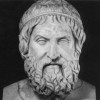Quotations about:
pain
Note not all quotations have been tagged, so Search may find additional quotes on this topic.
The Sting of a Reproach is the Truth of it.
Thomas Fuller (1654-1734) English physician, preacher, aphorist, writer
Gnomologia: Adages and Proverbs, #4769 (1732)
(Source)
Morality turns on whether the pleasure precedes or follows the pain. Thus it is immoral to get drunk because the headache comes after the drinking. But if the headache came first and the drunkenness afterwards, it would be moral to get drunk.
Samuel Butler (1835-1902) English novelist, satirist, scholar
The Note-Books of Samuel Butler, “Morality” (1912)
Full text.
Zeus, who guided mortals to be wise,
has established his fixed law —
wisdom comes through suffering.
Trouble, with its memories of pain,
drips in our hearts as we try to sleep,
so men against their will
learn to practice moderation.
Favours come to us from gods
seated on their solemn thrones —
such grace is harsh and violent.τὸν φρονεῖν βροτοὺς ὁδώ-
σαντα, τὸν [πάθει μάθος]
θέντα κυρίως ἔχειν.
στάζει δ’ ἀνθ’ ὕπνου πρὸ καρδίας
μνησιπήμων πόνος· καὶ παρ’ ἄ-
κοντας ἦλθε σωφρονεῖν.
δαιμόνων δέ που χάρις βίαιος
σέλμα σεμνὸν ἡμένων.Aeschylus (525-456 BC) Greek dramatist (Æschylus)
Agamemnon, ll. 175-183 [tr. Johnston (2007)]
(Source)
Alt. trans.:The first Hamilton alternate was used, slightly modified, by Robert Kennedy in his speech on the assassination of Martin Luther King, Jr. (4 Apr 1968). Kennedy's family used it as an epitaph on his grave Arlington National Cemetery: "Even in our sleep, pain which cannot forget, falls drop by drop upon the heart, until in our own despair, against our will, comes wisdom, through the awful grace of God."
- "It is through suffering that learning comes." [In Arnold Toynbee, "Christianity and Civilization" (1947), Civilization on Trial (1948)]
- "God, whose law it is that he who learns must suffer. And even in our sleep pain that cannot forget, falls drop by drop upon the heart, and in our own despite, against our will, comes wisdom to us by the awful grace of God." [tr. Hamilton (1930)]
- "Guide of mortal man to wisdom, he who has ordained a law, knowledge won through suffering. Drop, drop -- in our sleep, upon the heart sorrow falls, memory’s pain, and to us, though against our very will, even in our own despite, comes wisdom by the awful grace of God." [tr. Hamilton (1937)]
See here for more discussion.
LEONATO: For there was never a philosopher
That could endure the toothache patiently.William Shakespeare (1564-1616) English dramatist and poet
Much Ado About Nothing, Act 5, sc. 1, l. 37ff (5.1.37-38) (1598)
(Source)
For he that makes any thing his chiefest good, wherein justice or virtue does not bear a part, and sets up profit, not honesty, for the measure of his happiness; as long as he acts in conformity with his own principles, and is not overruled by the mere dictates of reason and humanity, can never do the offices of friendship, justice, or liberality: nor can he ever be a man of courage, who thinks that pain is the greatest evil; or he of temperance, who imagines pleasure to be the sovereign good.
[Nam qui summum bonum sic instituit, ut nihil habeat cum virtute coniunctum, idque suis commodis, non honestate metitur, hic, si sibi ipse consentiat et non interdum naturae bonitate vincatur neque amicitiam colere possit nec iustitiam nec liberalitatem; fortis vero dolorem summum malum iudicans aut temperans voluptatem summum bonum statuens esse certe nullo modo potest.]
Marcus Tullius Cicero (106-43 BC) Roman orator, statesman, philosopher
De Officiis [On Duties; On Moral Duty; The Offices], Book 1, ch. 2 (1.2) / sec. 5 (44 BC) [tr. Cockman (1699)]
(Source)
Attacking the Epicurean "highest good" of avoiding pain and seeking personal detachment; Cicero supported the Stoic virtues of courage and moderation.
(Source (Latin)). Alternate translations:
He who teaches that to be the chief good which hath no connection with virtue, which is measured by personal advantage, and not by honor; if he be consistent with himself, and not sometimes overcome by the benignity of nature, can neither cultivate friendship nor practice justice nor liberality. That man cannot be brave who believes pain the greatest evil; nor temperate, who believes pleasure the supreme good.
[tr. McCartney (1798)]
For if a man should lay down as the chief good, that which has no connexion with virtue, and measure it by his own interests, and not according to its moral merit; if such a man shall act consistently with his own principles, and is not sometimes influenced by the good ness of his heart, he can cultivate neither friendship, justice, nor generosity. In truth, it is impossible for the man to be brave who shall pronounce pain to be the greatest evil, or temperate who shall propose pleasure as the highest good.
[tr. Edmonds (1865)]
For he who so interprets the supreme good as to disjoin it from virtue, and measures it by his own convenience, and not by the standard of right, -- he, I say, if he be consistent with himself, and be not sometimes overcome by natural goodness, can cultivate neither friendship, nor justice, nor generosity; nor can he possibly be brave while he esteems pain as the greatest of evils, or temperate while he regards pleasure as the supreme good.
[tr. Peabody (1883)]
He who severs the highest good from virtue and measures it by interest and not by honour, if he were true to his principles and did not at times yield to his better nature, could not cultivate friendship, justice or liberality; and no one can be brave who declares pain the greatest evil, or temperate who maintains pleasure to be the highest good.
[tr. Gardiner (1899)]
For he who posits the supreme good as having no connection with virtue and measures it not by a moral standard but by his own interests -- if he should be consistent and not rather at times over-ruled by his better nature, he could value neither friendship nor justice nor generosity; and brave he surely cannot possibly be that counts pain the supreme evil, nor temperate he that holds pleasure to be the supreme good.
[tr. Miller (1913)]
Take, for example, the man who has established the kind of highest good that has nothing to do with virtue, that is, measured by the individual's convenience, not by his morality. If that man is consistent and is not in the meantime overcome by natural goodness, he cannot cultivate friendship, or justice, or openness of character. In fact, a man of courage who considers pain the greatest evil, or a temperate man who declares indulgence to be the greatest good, is surely an impossible contradiction.
[tr. Edinger (1974)]
No man can be brave who thinks pain the greatest evil; nor temperate, who considers pleasure the highest good.
[Source]
But he that dares not grasp the thorn
Should never crave the rose.
A clay pot sitting in the sun will always be a clay pot. It has to go through the white heat of the furnace to become porcelain.
Mildred W. Struven (1892-1983) American Christian Scientist, housewife
(Attributed)
Quoted by her daughter Jean Harris, Stranger in Two Worlds (1986)
If you are never scared or embarrassed or hurt, it means you never take chances.
Rosalyn Drexler (b. 1926) American visual artist, novelist, playwright, screenwriter [pseud. Julia Sorel]
See How She Runs (1978)
Based on the screenplay by Marvin Gluck. As Julia Sorrel (sometimes attrib. "Julia Soul").
Those who do not feel pain seldom think that it is felt.
Samuel Johnson (1709-1784) English writer, lexicographer, critic
The Rambler, #48 (1 Sep 1750)
(Source)
ROSALIND:O,
how full of briers is this working-day world!William Shakespeare (1564-1616) English dramatist and poet
As You Like It, Act 1, sc. 3, l. 11ff (1.3.11-12) (1599)
(Source)










